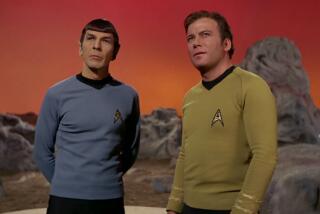Roddenberry’s Stellar Enterprise : An appreciation: Series creator struck a chord by projecting down-to-earth moral fables into a world where anything is possible.
- Share via
In person, Gene Roddenberry, who died this week at the age of 70, seemed as comfortably and contendedly earthbound as a prosperous small-city merchant. Yet, in creating “Star Trek,” he had done more than anyone else in television’s time to unleash thedeep-space imaginations of millions of watchers everywhere in the world.
The fact is that Roddenberry ranks with Jules Verne, H. G. Wells and his ongoing admirer Ray Bradbury in his proven power to conjure up another world where the impossible (or the not-yet-possible) is daily routine and humans can experience their fondest hopes--and now and again their scariest nightmares.
Roddenberry had the profound satisfaction, denied to all but few creators in or out of television, of seeing his creation triumphantly vindicated by the concerted will of the entertained who, in the case of “Star Trek,” forced the decision-makers to reverse themselves and give the show a new life on screens both large and small.
Science fiction at its finest has always been less a matter of gadgetries and bug-eyed monsters than a setting for commentaries on what and who we are, seen from a fresh perspective. It is a universal metaphor, with an uncommon number of foot-pounds of thrust.
Many of Bradbury’s stories are moral tales, set on Mars instead of Manhattan. Some of the most engaging episodes on “Star Trek” took the crew to far places where historical Earth dramas were being played out again, as if there were a second chance to get it right and so avoid the sorrows and the catastrophes.
It was sometimes as if the “Enterprise” had never left home. The remembrances of things future, as somebody once called the world of science-fiction fantasy, were in fact remembrances of things past--understated, and even unstated parables, on 20th-Century folks who never left Earth.
The immense and universal appeal of “Star Trek” was never hard to explain. At an obvious level, its characters are likable and appealing and the splendid gadgetries fulfill our not-so-secret dreams of flight, adventure and wondrous surprise. Who would mind being beamed up by Scottie, if the opportunity presented itself?
But there is as well a deeper level of appeal. As the Earth seems ever more a cacophonous, cluttered, polluted, corrupted, overcrowded, snarling and tawdry mess (dreams of Eden receding comet-like into the past), deep space has come to be--in the imagination at least--a place of new beginnings. (The last images of an embryo in Stanley Kubrick’s “2001: A Space Odyssey” were telling in this regard.)
Space, Bradbury once said, is the new focus for human idealism, very nearly a kind of extraterritorial religion, and we stand at the edge of it, as Columbus stood at the verge of a new world in 1492.
There are now, of course, devastatingly negative opinions on what we’ve done to Columbus’ new world. And Gene Roddenberry, to his credit and in the interest of livelier stories, never said everything was swell two millennia or so down the line. It was just that out there the good guys always won in the end; perfect intelligence was not an unrealizable dream, and all good things were possible.
It is wonderful to see for a little while that all good things really are possible, somewhere. And accordingly, it is likely that for years to come there will continue to be grateful passengers aboard Gene Roddenberry’s star ship, looking for that somewhere.
BRADBURY REMEMBERS
Author had a close bond with “Star Trek” creator. F11
More to Read
The complete guide to home viewing
Get Screen Gab for everything about the TV shows and streaming movies everyone’s talking about.
You may occasionally receive promotional content from the Los Angeles Times.






